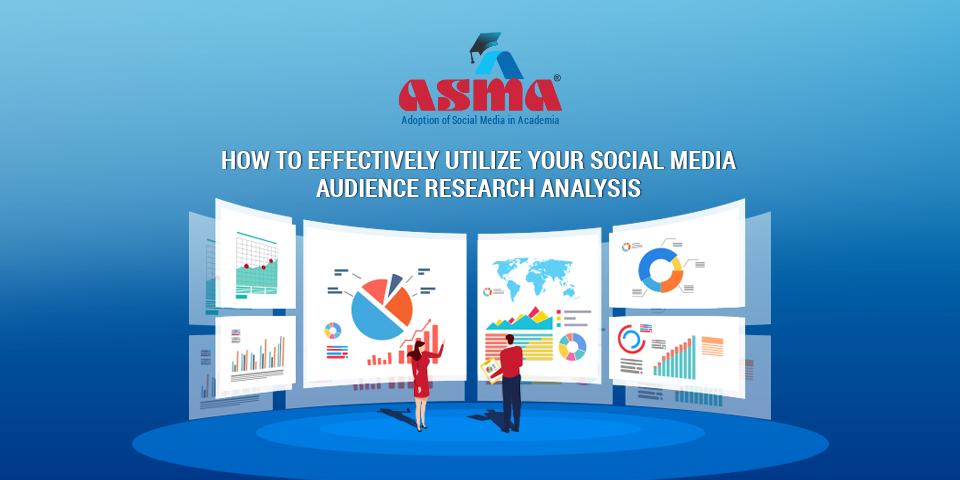How to Effectively Utilize Your Social Media Audience Research Analysis
Social Media Audience Research is a mechanism to study the online behaviour of your target audience on social media. Researching various aspects of the target audience for social media guides you where to find them and helps you to customize your campaign messages for your university or institution according to the need of your audience. It enables you to run campaigns on different platforms based on your customer’s interests, demographics, geographical location, and much more. That means you can ensure your campaign message reaches the right academic stakeholder. This also reduces advertising pilferage and maximizes return on your advertising investment.
Once your university/ institution has decided to complete your social media research, here’s what to do next from the analysis.
Identify what clicks for your target customers in your university
The more you know what your customers actually need and want, the better prepared you are to provide solutions for them. In-depth analysis of audience research can help in identifying your customers’ key requirements so that you can align your campaign strategy accordingly. Online advertising is replete with examples of campaigns that have successfully engaged the target audience and generated sales.
Choose the right channel/network for your institution
Why choosing the right channel is important? Simply because there is no point in spending time and money on platforms where your target audience doesn’t exist. This becomes fairly clear with your audience research. Different social media platforms have different purposes and therefore have set of audiences differ. After you have analysed your referral traffic and campaign results of social media channels, it’s important to use this information to focus on the networks where the target audience of your college/ university viz., prospective students, researchers, guest lecturers, parents, etc are hooked on.
When you know where your target audience is, you can design your marketing messages much more effectively and are sure that it will reach the right target audience. This will also optimize advertising spend and yield better results.
Do not underestimate the power of social media advertising
Reaching your customers organically is the easiest way to increase brand outreach, but the most effective way to ensure hitting the right target audience is by leveraging the power of social media advertising.
How do you do this? By creating content that addresses your academic stakeholder’s needs. And how do you know what interests your customers? Through your audience research.
Use simple tips for social media advertising to create sticky content that arouses the customer’s curiosity and generates interest in your academic brand. As suggested by social media experts, “You can take advantage of targeting features, rotate ads frequently, use small samples to test the text and images used in your ads, understand how ads are sold on different networks, design ads with mobile in mind etc.”
Through these tips, you can narrow down your social network to the ones you found most suitable in your audience research. Your audience research might have revealed characteristics about your target customer that you can put to use here.
Advertising Tips for Prominent Social Media Properties – Facebook / Twitter / Youtube / LinkedIn / Instagram
Washington based ‘The Pew Research Center’ rightly puts that, “Facebook is the most widely used of the major social media platforms and can be used to connect and engage students, its user base is most broadly representative of the population as a whole.” It is for this reason that you can effectively utilize the results of your audience research with Facebook’s advertising options. Facebook lets you target your ads based on user Demographics (education, location, age, gender, language etc.) along with more detailed targeting options such as Interests (hobbies, sports, technology, etc.) and Behaviors (including information gathered from Facebook’s partners)
Twitter can be used as a marketing tool, you can use Twitter Ads, Promoted Accounts, or Promoted Trends to advertise to your academic audience. Using your audience research, you can optimize your ads on Instagram, LinkedIn and YouTube to better align with the target customers for your university or college. Your social media audience research will also guide you on how to use hashtags that are relevant to your target audience.
You can use ad targeting options on these platforms to introduce your business and highlight your unique selling proposition so that the students, parents or other academic stakeholders being targeted want to click, follow, and engage. Include a pre-defined call to action to increase follows, retweets, and searches.
While designing ad campaigns, think about how your audience might react to certain taglines, colour tones etc. Studies carried out in the U.S. show a direct link between colour schemes used in marketing and branding campaigns and their effect on making purchase decisions. Consistency in marketing communication will help customers recognize your brand immediately and increase brand recall.
With these tips in mind, you can make sure your ads reach users who are actually and genuinely interested in your brand.
Final Suggestion
Social media audience research is a great tool to see whether your admissions marketing teams are moving in the right direction or not and whether your advertising budget is being put to effective use.
Social media audience research makes sure that your social media campaigns reach the right target audience of your institution with the right content that generates engagement. This is the best way to convert followers to leads and eventually to sales. It means you cannot take your postings lightly.
Follow the above strategies to get the most out of your audience research data analysis for optimizing business growth.
Let us know if you liked the article. Please share in the below comments which strategies you use in your university or institution.



